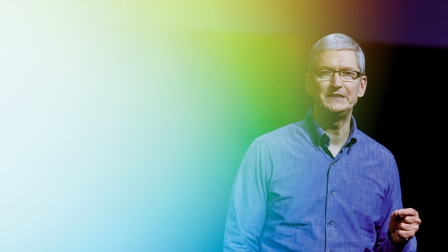Tim Cook On Apple’s Values, Mistakes, And Seeing Around Corners
In this exclusive interview, Apple’s CEO reveals the company’s boundless ambition.
Fast Company: Let’s start with this: Please define artificial intelligence for me.
Apple CEO Tim Cook: How would I define it? It’s a level of intelligence that’s been previously associated with humans that’s now in a device, and that usually has the ability to learn like a human.
Is there anything out there right now that you would consider an AI product, or is it just that there are products with AI features?
The latter. I can’t think of anything that is totally AI. But there are lots of products with AI features out there. And the exciting thing about AI is that it will open dramatically as we go down the line. We’ve been using AI for a long time. Sometimes I think that people think AI is a recent thing, and you know that it’s not. Maybe your readers know. But in the mainstream, I’m not sure that’s true. We’ve been using AI for years in so many different ways. The iTunes Store with recommendations is an example of using AI. Of course, you make that better and better over time. You will see an acceleration of those things.
Do you mean from Apple or from others?
I mean Apple, but I think there will be other players as well.
Does it worry you at all that people say Apple is behind in AI?
No. At Apple, not just today but in the 18 years I’ve been here, we tend to not talk about things that are not shipping. We try to keep those secret and surprise people. So we don’t have a conference to show people a multiyear road map. We show people what’s coming now, and we try to get developers excited about what they can do now. But, invariably, some people compare what we’re doing now to a vision or a product that somebody says they will create in the future. Or that may exist in the future. So you’re comparing something that may never exist, or something that is multiple years out, to something that is shipping today. So the simple answer to your question is, no.
At at time, when you’re covered so intensely by, you know, 750 websites or whatever, all of whom are trying to find this or that leak, do you think you’re still able to surprise people? Is the surprise part of keeping things secret as important as it once was?
I think it’s harder to keep secrets than it’s ever been, and that it has gotten increasingly more difficult with time. Every year is harder than the year before. That’s partly because there’s more sophisticated digging going on, partly because we’re larger and we’ve got more and more people that know about different things. All that makes it more difficult, but I think the reason to try is still there. And we have things today that no one has talked about, and that no one knows about . . .
But you’re going to tell me . . .
No, no, we’re not going to do that today.
Your task seems radically different from Steve’s. Would you agree?
No, I wouldn’t say it’s radically different. There are clearly differences. Those, to me, are differences in things like the fact that we’re much more global today. We’re well over $200 billion in revenue. The last full year Steve was CEO, I think we were $65 billion. The scale brings certain challenges that are new. Partly due to the scale, and partly due just to time, the government side is very different. The regulatory side, the government side. That is also partly driven by entering new markets. We’re in India and China in a materially different way than we were [when Steve Jobs ran Apple].
But if you sort of discount those and come back to what is the most important thing and what’s Apple’s reason for being, our reason for being is the same as it’s always been—to make the world’s best products that really enrich people’s lives. That hasn’t changed. And we do that through owning the primary technologies. So from my point of view, the most important thing is the same. These other things, it’s not that they’re not important, they are. They do make some things different, and provide some challenges and some opportunities that weren’t there before. But the core is the same. The value, the value system is the same.
What are some other examples of how scale changes things? [Apple analyst] Horace Dediu argues that that’s your primary responsibility, to take care of those billion people.
I’ve always thought that Apple’s primary role is to delight its customers, whether we had a few thousand of them, or a million of them, or now, when we have well over a billion active devices out there. Regardless of what the number is, we’ve always focused on taking care of them. That’s meant making great products, innovating, and surprising them, and having features embedded in our products that they don’t know are there when they buy, but that they find out some time later. These things are the same. They may come out in different forms. We have a large services area now, which we really didn’t have a few years ago.
Do you expect that to grow?
Oh yeah, I expect it to be huge. It’s already large. If you look at it on a stand-alone basis, and we’ve started disclosing this now, it’s tough to find many companies that are as big.
You just came from the [weekly] executive team meeting. Do you manage it differently from the way Steve did?
He and I have different styles, clearly. But that ET meeting has been going on at the same time on the same day for the 18-plus years I’ve been at the company.
Do you still go around the table to each executive?
Oh, yeah, and I don’t see a reason for changing that. If you want teams to function in the company, the team at the top of the company has to function. It can’t be stovepiped. People can’t have different objectives. Where you do have clashes and disagreement and creative friction—which we want—you want to quickly resolve things as well. You don’t want to let them fester. So that meeting is a time for getting in sync, and for arguing about the things that we may not be in sync on, and for discussing all the things that are in the company that are really important. And also to make sure everyone is very much focused. That is as important as it was 5, 10, 15, 18 years ago. The dialogue is a little different, but it’s a really important thing.
I don’t know how companies function that don’t have that. When I talk to some other CEOs and they talk about having a monthly staff meeting, I can’t imagine that. The executives here are really into details. We think the details wind up equaling the whole.
Are you still getting the details you need, even though the company’s as huge as it is?
Oh, yeah. It’s important, because you don’t want to lose a feeling of what’s really going on, whether it’s in the company or the customer base or any important constituency in the company. That has always been a great power here, one that’s not understood to this day. There are so many people that care about Apple. If they want to say something, plus or minus, they will take time to tell you. They’ll take time to tell you that they don’t like X or Y or that they love X or Y. I bet this morning I’ve already gotten 300 emails from customers, from employees, from everyone. A level of accessibility is what makes us stay grounded, and I think it’s super important. Sometimes it can become overwhelming, so you have to be able to step back a bit sometimes. But if you don’t pay attention, I think you become insular. That’s not the company that we are.
Is is hard to step back now that the company is covered so 24/7/365 as it is?
I don’t read all the coverage on Apple. The way that I look at that is, I really know the truth. And so if it’s stuff that is not quality journalism, I just don’t get affected by the noise. If somebody is doing a deep analysis, or a deep opinion, I’m very interested, because I might learn something, or I might see things from a different lens that I didn’t before. So if they’re writing product reviews, I’m really looking at that. If they’re writing about strategy. If they’re writing about Apple competitively, if they’re writing about how we’re coming to market in a country I care deeply about. If they’re writing something deeper, I’m interested and I’m reading. But if it’s just click bait, I’ve got too much to do.
Does someone filter the news for you?
No. Then someone else is playing your editor, and I think that’s dangerous. I want different points of view.
You used the word “editor.” People sometimes yearn for Steve’s “editing” capabilities and believe that if he were here, flaws that people see in various products wouldn’t be there. Do you have more flaws than you used to have?
Do I personally have more flaws than I used to? [laughing]
No, no . . . !
I’ve always had flaws. Always. I’ll go ahead on the record on that. I’ve always had flaws!
You can lie down for the rest of the interview.
Your question is, “Are we making more mistakes than we used to?” I don’t have a tracker on that, but I’ve been here for a lot of years. And we never said that we’re perfect. We’ve said that we seek that. And we try to do that in everything we do, and we care deeply about the details. But we also sometimes fall short. And we’ve fallen short other times as well, in the past and current. I’ll let somebody else judge whether it’s more or less. But the most important thing is not, “Do you fall short?” It’s, “Do you have the courage to admit that you’re wrong? And do you change? Or do you deny reality, stick your head in the sand, and not change?” The most important thing to me as a CEO is the first thing, that we keep the courage. That’s the most important thing. Because humans are not going to be flawless or perfect.
What do you think? Do you think we make more mistakes?
I think more of us are frustrated because you’re involved in more parts of our lives than you used to be, and that is clearly going to continue to be the case.
I think that raises the bar on us, and we’re up for the challenge. Our strategy is to help you in every part of your life that we can help you, whether you’re sitting in the living room and you want to experience better work on your desktop, or you’re on your phone, or you’re in your car and on CarPlay. We’re making inroads into your health, which is an area where many, many people want some improvements. We’re going to be in many places.
Do you ever feel that the desire to not make mistakes makes you too cautious?
The things that we do are bold. So we set out with bold objectives, but we proceed with care. And by care, I don’t mean checking everything a hundred times before you do anything. I mean that you really care deeply about the details, because the details make the difference between a great product and a good or average product. That’s what I mean by care. I wouldn’t confuse caution and care.
I look at Apple now and see you setting in place things designed to ensure that Apple is a great long-term company, in the way GE, or Intel, or others are great long-term companies. Is that something that you are consciously doing?
I want Apple to be here, you know, forever. I think it’s sort of this great jewel in America, and one that does a lot of good. It’s a force for good and empowers a lot of people to do things they couldn’t do before.
So what does it mean in today’s world? It means, to be in the markets we are in, you have to be global. It’s not a “like to be.” You must be. And that means being excellent in those markets. I think that’s really important.
You have to build a company that commands the ability to recruit the best and brightest. We are our people and that’s the sum of what we are able to do. We’re about people. People ultimately do everything here. Yes, we have IP. Yes, we have some real estate, but at the end of the day people can rip that off. People are the soul of the place. So how do you recruit the best people? That’s something we spend time on, to make sure we can do the best we can do. That’s the leadership and the management of the place.
More important than all that is the culture. Culture is the attraction of Apple. If you’re on the outside, why do you want to join Apple? You want to join Apple because you want to change the world. That was the attraction back in the garage, and that’s the attraction now. Now, the things 21-year-olds are looking for is different from back in 1978.
You’re confident that Apple is good at offering those things?
Yeah, I feel really good about it. Were you at the developers conference? I met so many unique kids. I met wicked smart people, people that are going to be here and they’re going to run the place. I feel really great about that. Not only in this country, but in many countries around the world, that core passion for Apple is there. It’s still deeply embedded in everyone here. That’s why everyone stays. That’s why our turnover is what it is, and why people keep reaching for something greater.
Do you think your public outreach on moral issues [like LGBTQ rights] helps attract 21-year-olds? Is that why you do it?
I don’t do it to recruit. I do it because I really believe it. Because I deeply believe. My belief is that companies should have values like people do. This company has values. Just like we have to pick and choose what to work on with products, we have to be very careful about what we pick. Because picking [one cause] means you’re not picking something else, and you can’t pick too many and do them with quality. With most of the public things we pick, there will be an intersection between the thing and our products. The environment is an example. We believe deeply in clean air and clean water. Doesn’t sound too controversial. Well, we make products, we manufacture things, we have data centers, so there’s a direct intersection there.
One final question: At a time when people worry about iPhone sales, looking out five years, is iPhone as central to this company as it is now? Will you then have other hardware products that will be as critical to a person’s technology experience as the iPhone is now?
The iPhone entered a market that was the biggest market on earth for electronic devices. And why is that? It’s because eventually, everyone will have one in the world. How many markets are there where everyone in the world wants one? There’s not too many things like that. From that point of view, it’s hard to imagine a market defined in units—not revenues—that’s that big.
Now, is the smartphone market going down? It currently may be down, or in the last quarter it may have been down. But if you look a little longer on the horizon, I see lots of emerging markets beginning to grow, where people are entering into middle class. It’s currently happening in China, but it’s going to be happening in India as well, which has as many people as China. Those are very young populations as well, so they desire technology even more. I think the smartphone itself as a window to the Internet, and as a window to people’s digital life, has a lot of legs and a lot of innovation left.
That said, we’re obviously working on things that we believe are big in addition to that. But we’re not doing those because we think there’s a problem here. I mean, I think anybody would love to be in this market. I mean, if you wanted to have just the iPhone company, I think the last time I looked it would be No. 5 on the Fortune 500 list. I think it’s important to keep a level of perspective on it.
But we’re always thinking what’s behind the corner, as we always were and are. We just don’t talk about what those things are. I know some people struggle with that, but I still think it’s right. Not just right for Apple; people like things they can do now. They like to use products that do something now. Yes, we all like to think about the Jetsons. I’ve been thinking about the Jetsons since I was a kid. But occasionally you want the Jetsons to come to reality. That’s what Apple is so great at, productizing things and bringing it to you, so you can be a part of it. Not just so that it’s some sort of in-the-cloud.
[As we wrap up, we talk briefly about health care.]
We’ve gotten into the health arena. We started looking at wellness, and that took us to pulling a string to think about research; then we pulled a string a little further, and it took us to some patient care stuff; and we pulled a string that’s taking us into some other stuff. It’s clear that when you look at most of the solutions, whether it’s devices, or things coming up out of Big Pharma, that first and foremost they are done to get the reimbursement. Not thinking about what helps the patient. And, so, if you don’t care about reimbursement—which we have the privilege of doing because we have no market share of something huge, that may even make the smartphone market look small—then you begin to think about a lot of things. But the reimbursement is the thing, that’s the mental block that people have.
Read more stories from inside Tim Cook’s Apple:
- Playing The Long Game Inside Tim Cook’s Apple
- 9 Ways Tim Cook Has Transformed Apple
- Apple Music’s Bozoma Saint John: It’s About Passion, Not Algorithms
- Why Cory Doctorow Thinks Apple’s Disappearing Headphone Jack Should Scare You
- The iPhone 7 Is Coming: Here’s Everything We’ve Heard So Far
- What I Learned Working With Jony Ive’s Team On The Apple Watch
- Four Reasons Why Betting Against Apple Is A Fool’s Game
Fast Company , Read Full Story
(43)













